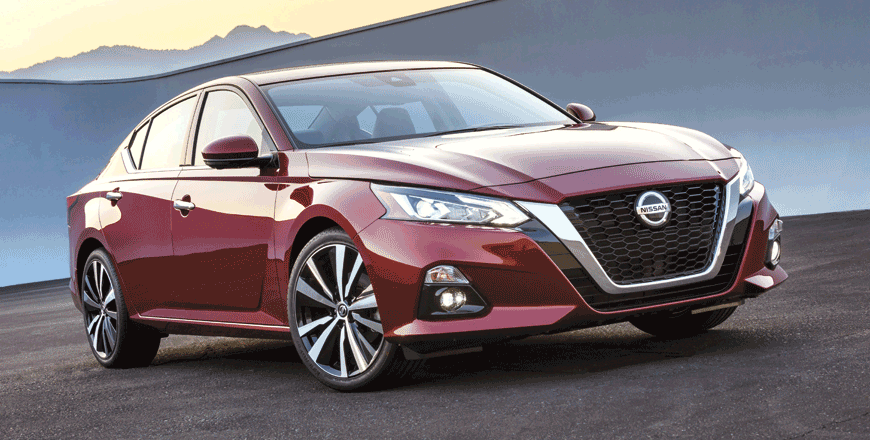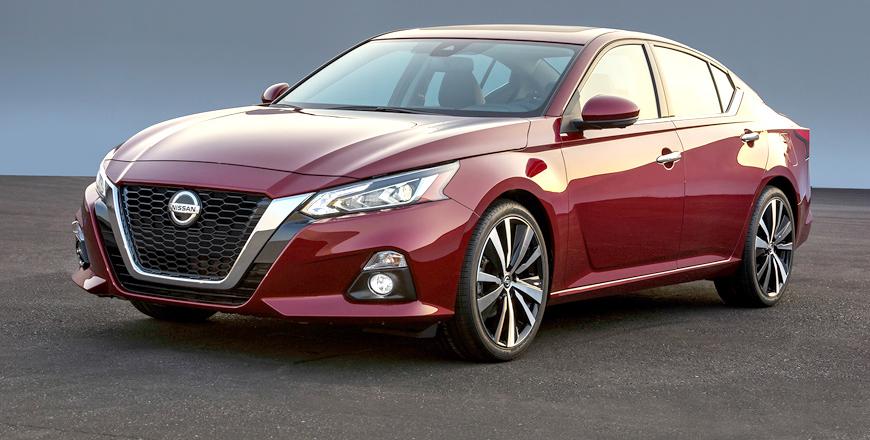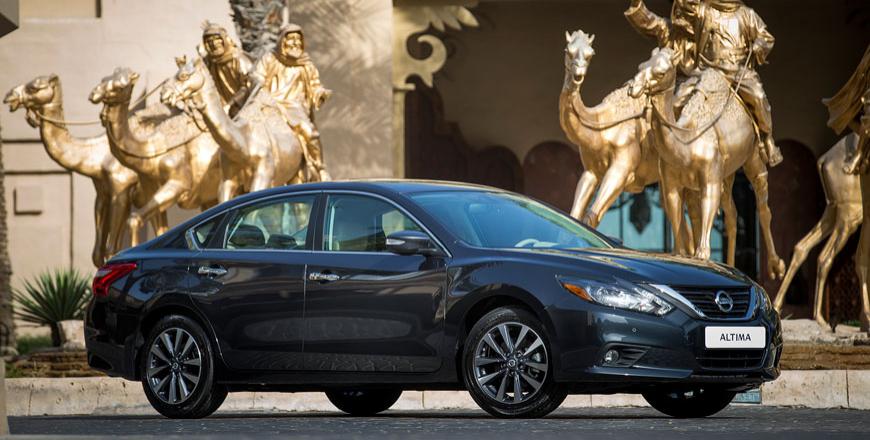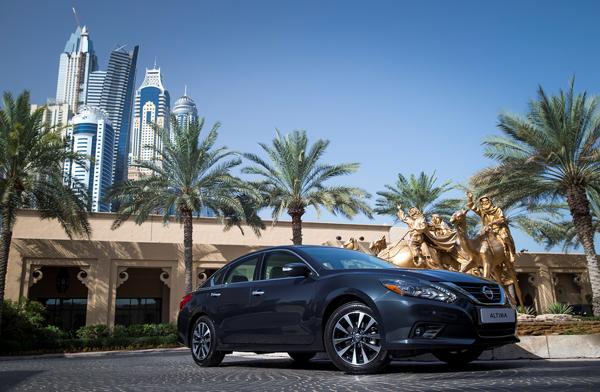You are here
Nissan Altima 2.5 SL: A sportier sensibility
By Ghaith Madadha - Nov 14,2022 - Last updated at Nov 14,2022

Launched in 2018, the sixth generation Nissan Altima is the most technologically advanced incarnation of the Japanese manufacturer’s popular mid-size saloon. A more rewardingly sporty drive than its predecessor, the latest Altima receives many high tech driver-assistance features, but its biggest claim to fame is in being the second car to bring to market Nissan’s innovative turbocharged variable compression 2-litre engine. That said, the Altima also retains the use of a heavily revised evolution of Nissan’s familiar naturally-aspirated 2.5-litre engine.
Unpretentiously dramatic
A thoroughly enhanced, upgraded and well-equipped successor model, the Altima, however, remains accessibly positioned and well-competes with new ‘“premium” pretenders, without adopting any such similar fashionable pretensions itself. That said, the Altima represents a clear step up from its predecessor in terms of design, and sports a distinctly more athletic style over its predecessor. With a lower, more rakish roofline, snoutier nose, more muscular bonnet and more chiseled body surfacing, the latest Altima has a sportier and more urgent demeanour.
Less complicated, cleaner, and better flowing and detailed, the sixth generation model is unmistakably identifiable as an Altima, but has a sportier, better integrated and more up-market presence. Featuring a straight-cut horizontal bonnet shut line that sweeps back to a clamshell design and fluently trails off to into a long side crease line, the Altima has a sportily fresh sense of style. Its now lower-set and wider chrome outlined V-motion grille, is meanwhile flanked by slimmer, deeper-set and better incorporated headlights.
Enhanced and efficient
Playing second fiddle to the top spec Altima’s powerful, yet, efficient 248BHP turbocharged 2-litre variable compression engine, the naturally-aspirated entry-level 2.5-litre 4-cylinder engine is nevertheless a proven and capable engine. Heavily updated for the sixth generation Altima, the more powerful 2.5L engine is smoother and more refined, and gains a thermal-insulated intake port and direct fuel injection. As a result, the revised engine develops 188BHP at 6,000rpm and 180lb/ft torque at 3,600rpm, and returns improved 7.35l/100km combined cycle fuel efficiency.
Smooth and responsively eager from standstill, the Altima 2.5L’s long stroke under-square engine design helps deliver good flexibility even at low revs. Developing power in a linear and progressive fashion, it revs happily to its 6,200rpm redline, but is consistently confident and comfortably flexible from cruising speed, and at mid-range engine speeds. Capable of accelerating through 0-100km/h in approximately 7.5-seconds or less, the naturally-aspirated 2.5L engine also provides good throttle control, to allow one to accurately dial in power increments.
Rewarding ride
The Altima’s 2.5-litre engine is well-suited to it continuously variable transmission, in terms of seamless smooth transitions through ratios, and efficiency. However, a traditional manual or automatic, with ratios delineated by actual gears, would have been more rewarding and better complemented the Altima’s sporting side. That said, Nissan’s CVT is one of the better such systems around, and allows the engine to rev better than others, and features less of the elastic “slingshot” feel associated with CVTs under hard acceleration.
Sportier than expected for a 1,500kg front-wheel-drive mid-size saloon, the latest Altima is dynamically better integrated than the outgoing model, with much improved agility, adjustability and driver involvement. An entertaining drive with quick responses, talented chassis and slightly less front weight bias, it seems tidier and lighter turning into corners than previous models, with improved front grip. Gaining better cornering body roll control than its predecessor, the new Altima’s electric-assisted steering is meanwhile light, accurate and quick at 2.8-turns lock-to-lock.
Eager and engaging
Eager and engaging for its segment, the Altima’s steering delivers decent feel, while its chassis proved adjustable and willing to shift weight to the rear outside wheel to tighten a cornering line wheel when provoked. Nimbler than many rivals, it seems to shrink around the driver. That said, it corners with reassuring commitment and is a refined, stable, and smooth motorway companion. Easy to park and maneuver in town the Altima’s suspension meanwhile delivered the right balance between comfort and control.
Well-equipped standard and optional features, the Altima’s driver assistance systems include Trace Control torque vectoring, which enhances stability and agility. Additionally available high tech safety systems include rear cross-path, lane departure, blind spot, emergency braking and pedestrian detection. Sportier and more elegant, the Altima’s horizontally-oriented cabin is uncluttered and user-friendly. Providing a good driving position and visibility, the Altima is comfortable and better spaced than many competitors. However, slightly larger front seats, side bolstering and rear headroom, would be welcome by taller, larger occupants.
Nissan Altima 2.5 SL
Engine: 2.5-litre, transverse 4-cylinders
Bore x stroke: 89 x 100mm
Compression: 12:1
Valve-train: Direct injection, 16-valve, DOHC, variable valve timing
Rev limit: 6,200rpm
Gearbox: Continuously variable transmission (CVT) auto, front-wheel-drive
Transmission ratio: 2.631:1-0.378:1
Reverse/final drive ratios: 1.96:1/4.828:1
Power, BHP (PS) [kW]: 188 (191) [140] @6,000rpm
Specific power: 75.5BHP/litre
Power-to-weight: 125.3BHP/tonne
Torque, lb/ft (Nm): 180 (244) @3,600rpm
Specific torque: 98Nm/litre
Torque-to-weight: 162.6Nm/tonne
0-100km/h: approximately 7.5-seconds (estimate)
Fuel economy, combined: 7.35-litres/100km
Fuel capacity: 61-litres
Length: 4,900mm
Width: 1,851mm
Height: 1,442mm
Wheelbase: 2,825mm
Track: 1,605mm
Aerodynamic drag co-efficiency: 0.26
Head room, F/R (with sunroof): 965/932mm
Legroom, F/R: 1,112/894mm
Shoulder room, F/R: 1,478/1,450mm
Hip room, F/R: 1,389/1,384mm
Luggage volume: 436-litres
Kerb weight: 1,500kg
Weight distribution, F/R: 60/40%
Steering: Electric-assisted rack & pinion
Steering ratio: 15.3:
Lock-to-lock: 2.8-turn
Turning circle: 11.4-metres
Suspension, F/R: MacPherson struts / multilink
Brakes, F/R: Ventilated discs, 282mm/discs, 280mm
Tyres: 235/40R19
Related Articles
A venerable and attainable mid-size middle of the road family saloon that performed well on so many levels, if not necessarily the best on e
Launched regionally in Dubai in tandem with Nissan Middle East’s end of the financial year announcement, the latest incarnation of the Japan
First introduced in 2013 and now thoroughly redesigned and enhanced for 2016, the new Nissan Altima, brings an assertive new corporate desig



















